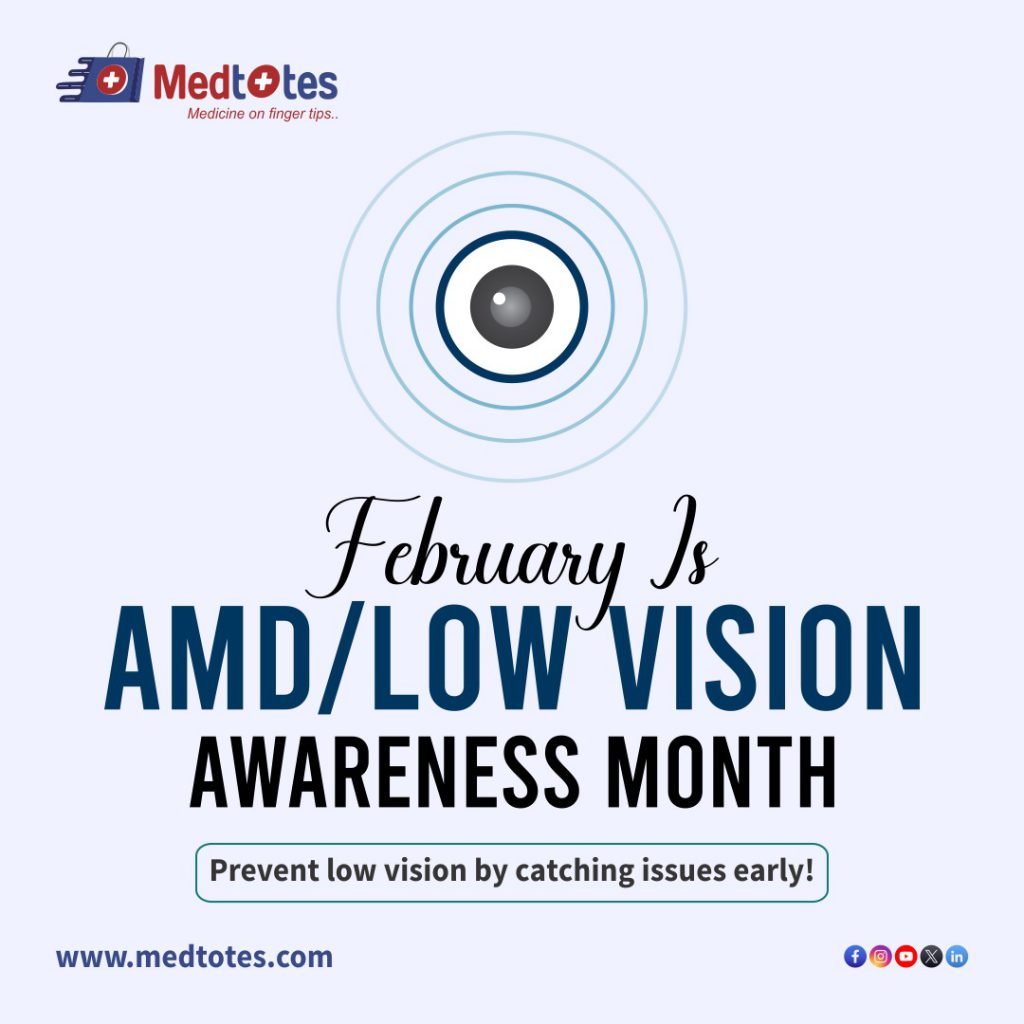I. INTRODUCTION
February is AMD/LOW Vision awareness month, highlighting the challenges faced by individuals with age-related macular degeneration and low vision. The month aims to raise awareness about these conditions and their impact on daily life. Education, advocacy, and support are used to empower individuals with AMD and low vision to lead fulfilling, independent lives. Early detection and intervention are encouraged, as understanding symptoms and risk factors can improve quality of life. Awareness Month also promotes research and advancements in treatment options, ultimately working towards finding a cure for AMD and improving access to vision rehabilitation services for low vision individuals.

II. WHAT IS AMD?
Age-related macular degeneration (AMD) is a common eye condition that affects the macula, responsible for sharp, central vision. It is the leading cause of vision loss for people over 50. AMD can be divided into two forms: dry AMD, which progresses slowly and is characterized by drusen, and wet AMD, which progresses rapidly due to abnormal blood vessel growth. Both forms can cause central vision loss, making it difficult to read, drive, recognize faces, and perform everyday tasks. AMD significantly impacts the quality of life for those affected. Treatment options vary depending on the form and severity of the condition. Lifestyle changes like quitting smoking and a healthy diet rich in antioxidants may slow down AMD progression. For wet AMD, anti-VEGF injections or laser therapy may be recommended. Regular eye exams and early detection are crucial for managing AMD and preserving vision.
III. UNDERSTANDING LOW VISION
Low vision is a significant loss of vision that cannot be fully corrected with glasses, contact lenses, medication, or surgery. It affects daily activities and can lead to decreased independence and quality of life. Rehabilitation services like vision therapy, assistive devices, and adaptive techniques can help maintain independence and maximize remaining vision. Low vision specialists provide personalized strategies and resources to improve daily functioning. They assess individual needs, recommend devices like magnifiers, telescopes, and electronic devices, teach effective device usage, and guide home environment modifications for safety and accessibility. They also work with individuals to develop personalized rehabilitation plans, including vision exercises and training, to improve visual skills and maximize functional vision. With the help of these professionals, individuals with AMD can regain confidence and independence in their daily lives.
IV. SYMPTOMS AND DIAGNOSIS
- Blurred or distorted vision
- Difficulty reading or recognizing faces
- Decreased central vision
- Dark or empty spots in the vision
- Diagnosis:
- Comprehensive eye exam
- Visual acuity test
- Dilated eye exam
- Amsler grid test
- Optical coherence tomography (OCT)
DIAGNOSIS
- Blurred or distorted vision can be diagnosed through a visual acuity test and a comprehensive eye exam.
- Difficulty reading or recognizing faces can be diagnosed through the Amsler grid test and a dilated eye exam.
- Decreased central vision can be diagnosed through the use of an optical coherence tomography (OCT) scan.
- Dark or empty spots in vision can also be detected through a comprehensive eye exam and a dilated eye exam.
V. TREATMENT AND MANAGEMENT
- Treatment for blurred or distorted vision may include prescription glasses or contact lenses.
- Treatment for difficulty reading or recognizing faces may involve vision therapy or low vision aids.
- Treatment for decreased central vision may include medication, laser treatment, or surgery, depending on the underlying cause.
- Treatment for dark or empty spots in vision may vary depending on the specific diagnosis, ranging from medication to surgical intervention.
- In some cases, lifestyle changes, such as quitting smoking or adopting a healthy diet, may also help manage vision problems.
VI. CONCLUSION
In conclusion, Eye care professionals are crucial for diagnosing and treating vision problems. Some may require corrective lenses or lifestyle changes, while others may require advanced treatments like medication, laser treatment, or surgery. Addressing vision problems promptly is essential to prevent further deterioration and maintain good eye health.
Download our app: https://bit.ly/3tkQkFy
